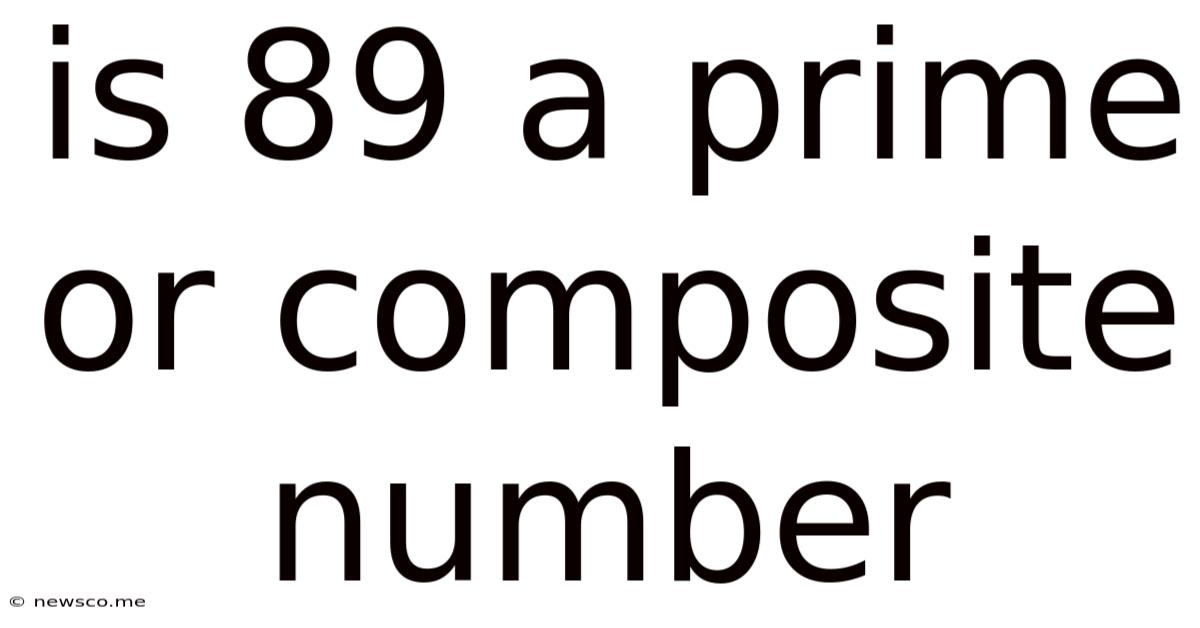Is 89 A Prime Or Composite Number
News Co
Apr 18, 2025 · 5 min read

Table of Contents
Is 89 a Prime or Composite Number? A Deep Dive into Number Theory
Determining whether a number is prime or composite is a fundamental concept in number theory. While seemingly simple for smaller numbers, the classification can become complex as we delve into larger integers. This article will explore the question: Is 89 a prime or composite number? We'll not only answer this specific question but also delve into the underlying principles of prime and composite numbers, providing you with a comprehensive understanding of the topic.
Understanding Prime and Composite Numbers
Before we tackle the question about 89, let's establish a solid foundation.
What is a Prime Number?
A prime number is a natural number greater than 1 that has no positive divisors other than 1 and itself. This means it's only divisible by 1 and itself without leaving a remainder. The first few prime numbers are 2, 3, 5, 7, 11, and so on. Note that 1 is neither prime nor composite.
What is a Composite Number?
A composite number is a natural number greater than 1 that is not a prime number. In other words, it has at least one positive divisor other than 1 and itself. Examples include 4 (divisible by 2), 6 (divisible by 2 and 3), 9 (divisible by 3), and countless others.
The Importance of Prime Numbers
Prime numbers form the building blocks of all other whole numbers. The Fundamental Theorem of Arithmetic states that every integer greater than 1 can be uniquely represented as a product of prime numbers (ignoring the order of the factors). This fundamental property makes prime numbers crucial in various areas of mathematics, including cryptography, computer science, and more.
Determining if 89 is Prime or Composite
Now, let's address the central question: Is 89 a prime or composite number?
To determine this, we need to check if 89 is divisible by any whole number other than 1 and itself. The most straightforward approach is to test for divisibility by prime numbers less than the square root of 89. The square root of 89 is approximately 9.43. Therefore, we only need to check for divisibility by prime numbers less than 9.43, which are 2, 3, 5, and 7.
- Divisibility by 2: 89 is not divisible by 2 because it's an odd number.
- Divisibility by 3: The sum of the digits of 89 is 8 + 9 = 17, which is not divisible by 3. Therefore, 89 is not divisible by 3.
- Divisibility by 5: 89 does not end in 0 or 5, so it's not divisible by 5.
- Divisibility by 7: Dividing 89 by 7 gives a quotient of 12 with a remainder of 5. Therefore, 89 is not divisible by 7.
Since 89 is not divisible by any prime number less than its square root, we can conclude that 89 is a prime number.
Advanced Techniques for Prime Number Determination
While the trial division method works well for relatively small numbers like 89, it becomes computationally expensive for significantly larger numbers. More sophisticated algorithms are employed for determining the primality of larger integers. These include:
The Sieve of Eratosthenes
This ancient algorithm efficiently generates a list of prime numbers up to a specified limit. It works by iteratively marking the multiples of each prime number as composite.
Miller-Rabin Primality Test
This probabilistic test is widely used for large numbers. It doesn't guarantee primality with 100% certainty but provides a high probability of correctness. It's much faster than deterministic primality tests for large integers.
AKS Primality Test
The AKS primality test is a deterministic polynomial-time algorithm. This means its runtime is bounded by a polynomial function of the number of digits in the input number. While theoretically significant, it's not as efficient in practice as probabilistic tests like Miller-Rabin for very large numbers.
Applications of Prime Numbers
The seemingly abstract concept of prime numbers has far-reaching applications in various fields:
Cryptography
Prime numbers are fundamental to modern cryptography. Many encryption algorithms, such as RSA, rely heavily on the difficulty of factoring large numbers into their prime components. The security of these systems hinges on the computational infeasibility of factoring the product of two very large prime numbers.
Hashing Algorithms
Prime numbers are often used in hashing algorithms to minimize collisions. Hashing is a technique for mapping data of arbitrary size to data of fixed size. Using prime numbers in hash functions can improve the distribution of data, reducing the likelihood of different data items mapping to the same hash value.
Coding Theory
Prime numbers play a role in error-correcting codes, which are used to detect and correct errors in data transmission and storage. Certain code constructions utilize the properties of prime numbers to achieve efficient error detection and correction.
Conclusion: 89 – A Prime Example
We've definitively established that 89 is a prime number. This seemingly simple question has led us on a journey into the fascinating world of number theory, highlighting the importance and applications of prime numbers. From the basic concepts of prime and composite numbers to advanced primality testing algorithms and real-world applications, we've explored a significant portion of this mathematical field. Understanding prime numbers is not just an academic exercise; it's crucial for comprehending the foundations of mathematics and its diverse applications in modern technology. The next time you encounter a number, consider its prime factorization – it might reveal surprising insights into its nature and properties. Remember, even a seemingly simple number like 89 holds a significant place within the vast landscape of mathematical principles.
Latest Posts
Related Post
Thank you for visiting our website which covers about Is 89 A Prime Or Composite Number . We hope the information provided has been useful to you. Feel free to contact us if you have any questions or need further assistance. See you next time and don't miss to bookmark.